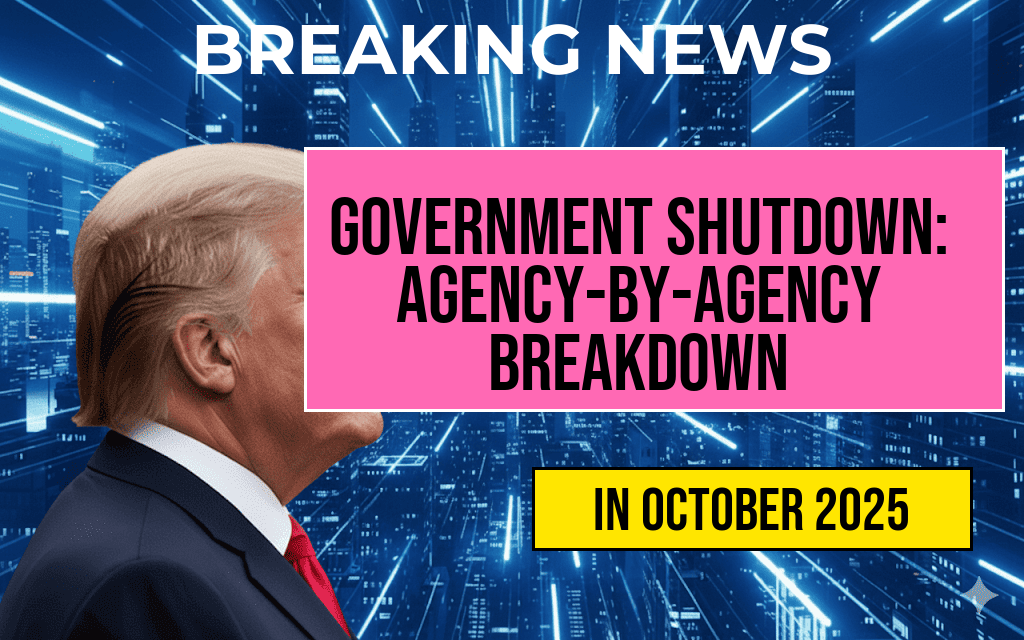The ongoing government shutdown has entered a critical phase, impacting numerous federal agencies and services across the nation. With congressional negotiations stalled over funding agreements, many government functions have either scaled back operations or halted altogether. This shutdown, now in its second week, is creating widespread uncertainty for millions of Americans relying on federal programs, including Social Security, the Internal Revenue Service (IRS), defense operations, and transportation security. While some agencies are deemed essential and continue functioning, others have suspended non-essential activities, leading to delays, service disruptions, and economic ripple effects. This article provides an agency-by-agency breakdown of how the shutdown is affecting core government functions and what Americans can expect in the coming days.
Impacts on Federal Agencies and Services
Social Security Administration
- Operational Status: The Social Security Administration (SSA) remains largely open, continuing to process benefits and respond to inquiries. However, many local offices are closed or operating with limited staff, resulting in longer wait times for in-person services.
- Implications: While monthly benefit payments are secure, applicants seeking replacement cards, proof of benefits, or scheduling new appointments face delays. Online and phone services are still available, but some processing times may increase due to reduced staffing.
Internal Revenue Service (IRS)
- Operational Status: Most IRS functions are halted, including audits, correspondence processing, and customer service via phone and online chat. Essential functions like processing refunds are limited but continue for certain cases.
- Implications: Taxpayers expecting refunds or needing assistance encounter delays, especially for complex inquiries. The IRS website remains operational for basic information, but scheduled audits and enforcement actions are postponed.
Defense Department
- Operational Status: The Department of Defense (DoD) continues some essential functions, including maintaining national security, military operations, and support for active-duty personnel. However, non-essential activities, such as administrative tasks, training exercises, and maintenance projects, are suspended.
- Implications: Many civilian employees face furloughs, leading to disruptions in support services and civilian workforce management. Military operations remain largely unaffected, but research activities and base services may see delays.
Transportation Security Administration (TSA)
- Operational Status: TSA security checkpoints at airports remain fully operational, as staffing levels are maintained to ensure aviation safety. However, some non-security airport operations and administrative functions are reduced or halted.
- Implications: Travelers should expect normal security procedures but may experience longer lines at some airports due to staffing constraints in non-security roles. The agency emphasizes that passenger screening remains unaffected.
Other Notable Agency Effects
| Agency | Essential Services | Non-Essential Services Suspended |
|---|---|---|
| Federal Emergency Management Agency (FEMA) | Disaster response and recovery operations | Public outreach, grants, and training programs |
| U.S. Postal Service | Mail delivery and essential logistics | Customer service counters in post offices |
| Environmental Protection Agency (EPA) | Critical safety inspections and enforcement | Research and regulatory activities |
Economic and Public Impact
The shutdown’s ripple effects extend beyond agency operations, influencing markets, employment, and public confidence. Small businesses reliant on federal permits or loans face delays, while the stock market reacts cautiously to ongoing political impasses. Consumer confidence dips as uncertainty over federal service continuity grows. Economists estimate that prolonged shutdowns can cost the economy billions daily, with ripple effects felt across sectors.
Government Funding and Political Deadlock
The shutdown stems from disagreements over budget allocations, often tied to broader policy disputes. Lawmakers have yet to reach a consensus on funding levels or policy riders, prolonging the status quo. Negotiators continue to hold talks, but prospects for immediate resolution remain uncertain. The current impasse highlights the ongoing challenges in balancing fiscal priorities and political differences within Congress.
What Americans Should Know
- Access to Benefits: Most social safety net programs like Social Security and Medicare remain operational, ensuring continued support for beneficiaries.
- Travel and Transportation: TSA assures travelers that airport security remains unaffected, but travelers should plan for potential delays at some airports.
- Tax and Financial Services: Expect delays in IRS processing and customer service inquiries, which could impact tax refunds and compliance activities.
- Employment and Furloughs: Thousands of federal employees face furloughs, with some working without pay until funding is restored.
As the political stalemate continues, agencies are preparing for possible extensions of the shutdown and advising the public to stay informed through official channels. Citizens affected by service disruptions are encouraged to check agency websites regularly for updates and guidance.
For more information on the shutdown’s implications, visit Wikipedia’s overview of government shutdowns or consult the Forbes Government & Politics section.
Frequently Asked Questions
What areas are impacted by the government shutdown according to the agency breakdown?
The government shutdown affects various agencies differently, with some continuing essential operations such as Social Security and TSA, while others like the IRS and certain defense functions face non-essential closures or delays.
Will Social Security payments be affected during the shutdown?
No, Social Security payments are considered essential and will continue as usual despite the government shutdown.
How does the shutdown impact the operations of the IRS?
During the government shutdown, most IRS services are temporarily non-essential and will be suspended, which may delay tax processing and refunds.
Are Defense and TSA operations affected by the shutdown?
Defense operations deemed essential will continue, but some non-essential activities may be reduced. TSA security screening at airports remains operational to ensure public safety.
What should travelers expect at airports during the shutdown?
Travelers can expect TSA operations to continue normally, with security screenings functioning as usual, since TSA is classified as an essential service.








